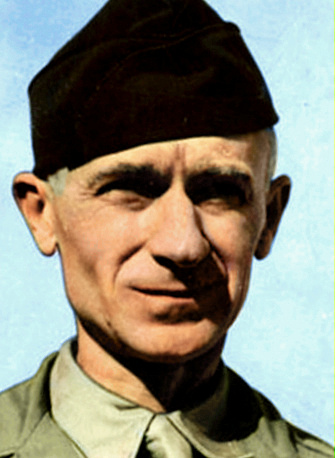Berlin afire from end to end, flight over city shows
Reporter in U.S. plane sights artillery battles raging in German capital
By Lowell Thomas, NBC war correspondent
PARIS, France – Berlin is in flames from one end to the other. Dense clouds of smoke hide most of the city.
I flew to Berlin yesterday in a P-51 Mustang with a crack pilot of the 67th Reconnaissance Group of the Ninth Air Force.
I saw the city in flames saw the bombardment going on between the Russians and Nazis, and then I raced back across half Europe to Paris last night.
‘When do we join?’
My flight came about this way: For two days I had been with the ground troops near the advancing Russians – with Gen. Terry Allen and his 104th Division Timberwolves, on the Mulde River, with the Russians only 18 miles away, and the Germans in between.
All along the front, the one thought had been: When do we join up with the Russians? An Allied pilot with the Timberwolves brought word that the Russians, some miles to the north, were driving west at top speed. It looked as though the 2nd Armored Division of the Ninth Army would be the first to make it.
Flies piggyback
So, I decided to try to find a fighter pilot who would like to take a look all up and down the front. When I was back with the 67th Reconnaissance Group, they had invited me to do this. So, there I flew in a light artillery plane – and in no time two fast Mustangs were on the line.
In one, alone, was the officer in command, Lt. Col. Dick Leghorn of Winchester, Massachusetts. His job was to fly cover, as they call it – protect us from enemy aircraft. My pilot was Lt. Col. Carl Kraft of Clarks, Louisiana, No. 2 in command of the 67th. Both were in single-seater fighter planes, with me squeezed in behind Col. Kraft. Piggyback, they call that – the most cramped position so far devised by man.
Sees artillery battle
Here are some of the things we saw.
Berlin in flames, but not entirely. Potsdam and the southern side of the city seemed comparatively undamaged. The rest was in flames, from one end to the other.
An artillery battle was going on, heavy guns on both sides going all out – dense columns of smoke blowing over Berlin, concealing much of it.
Recrossing Nazi territory – following the Elbe, and then the Mulde, to where the two join at Dessau – we saw fires every mile or so, indicating that the Russians had advanced to the middle of the German-held corridor between the rivers, or that the fires were started by Russian artillery.
